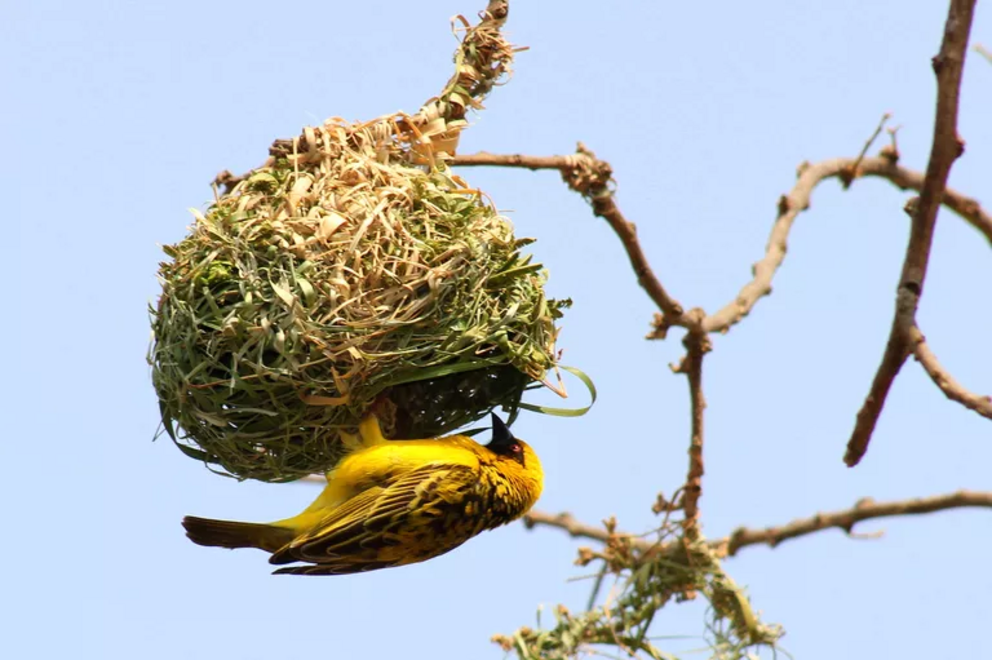Vegetarian birds are more social than carnivorous ones
Weaver birds are named for their elaborate nests.
They also tend to be more promiscuous.
Weavers are a family of 118 small songbird species that are known for the elaborate nests they create.1 But researchers recently discovered something more fascinating about these creatures than their creative architecture.2
Their diet seems to have a major impact on their social behavior, including how promiscuous they are.
Researchers analyzed various studies on many species of weavers living primarily in sub-Saharan Africa. They found that those that ate seeds tended to flock together and live in colonies more often than those weaver species that eat insects.3
Researchers from the University of Bath in the United Kingdom were following up on a study by British ethologist John Crook, who was the first to suggest a link between diet, habitat, and social behavior in 1964. Crook’s study is influential for ecologists who study behavior.4
“Crook produced an important study that has stimulated a lot of research in the past 50 odd years,” lead researcher Tamás Székely, from the Milner Centre for Evolution at the University of Bath, tells Treehugger. “However, he did not have statistics to back up his statements, so we decided to revisit his ideas using modern statistical approaches.”
The researchers analyzed data collected from previously published studies of various weaver species in order to take a closer look at the relationships between diet, habitat, and social behavior.
There are some weaver species that live on the savannah and eat seeds, while others live in forests and mainly eat insects.3
Scientists aren’t certain why they have diverse diets.
“We don’t know,” Székely says. “The diet probably evolves over a long time to make best use of the locally available food resources.”
Researchers found that the species that live in the open savannah most often would flock together and forage in groups in order to find the best sources of food. Those seed-eating birds nested in large colonies and often were polygamous, researchers found, pairing off with many mates during each breeding season.3
“The main finding of our work was that seed-eating weavers are more sociable than insectivorous ones presumably since seeds are easier to find and locally more abundant in savannah than in the forest,” Székely says.
The findings were published in the journal American Naturalist.
The Impact of Habitat
Habitat plays a key role in flocking and other social behaviors.
It’s more efficient for birds that feed on seeds in the open savannah to flock with other birds because it’s easier to find meals as a group. Being part of a flock also lowers the risk of predators because the birds have safety in numbers when they’re out in the open.3
While meals are easier to find as a group, there are fewer nesting sites, so the birds tend to live together in colonies. These close quarters often mean birds tend to have several mates.3
Weavers that live in the forest and eat insects have to search a broader area to find food. They don’t have to rely on other birds to help find insects. And, because the forest is a safer, closed area, it offers lots of good nesting locations, so the birds don’t have to live together in groups. Because of this, the birds tend to stay with the same mate during breeding season.3
“In the savannah, the good nesting sites are limited to a small number of trees whereas in a forest there are plenty of available nest sites,” Székely says. “This facilitates colonial nesting and flocking behavior in savannah breeding wavers.”
An Interesting Behavior
Researchers don’t believe this behavior is unique to weavers. Other species might exhibit a similar link between diet, habitat, and social activity.
“We suspect the concept may be general but to establish the associations in other species will need further investigations,” Székely says.
“It is genuinely interesting to work out what drives social behavior in birds, humans, and beyond. The Crook 1964 study was a landmark, and our statistical analyses vindicated his statements.”
Fact checked by Haley Mast
For full references please use source link below.

